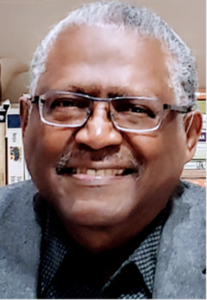Menu
Arthur Spears
City University of New York

Arthur K. Spears is Presidential Professor Emeritus of Anthropology and Linguistics at The City University of New York (The Graduate Center and City College). At City College, he served as chair of the Anthropology Department for many years and as Director of the Black Studies Program. He is the founder and first editor of the Black anthropologists’ journal, Transforming Anthropology; and, from 2007-2009, he was the president of the Society for Pidgin and Creole Linguistics. Prof. Spears’ research spans linguistic anthropology, pidgins/creoles and language contact, grammatical analysis, race and ethnicity, education, and ideology. His language specialties are Haitian Creole and African American English (AAE). One strand in all of his writing has focused on race/skin color, internalized oppression, ideology, and decolonial thinking with special reference to academic cultures, language in general and African American English in particular.
Prof. Spears was raised in the United States during the U.S. Reign of Terror (Jim Crow Era) in a multiclass and residentially class-mixed Black ghetto. The school district there was separate from the white one and totally Black, with only one Black high school. All employees of the school district were Black, including the district’s superintendent, who reported to the city’s White superintendent. The socioeconomic class ecology of the ghetto made possible Prof. Spears’ close friendships and other relationships with those ranging from the poorest to the wealthiest members of the ghetto. That ecology also produced a Black high school that was—with great irony--better in terms of instruction and student outcomes than the White high schools, and outcome not uncommon nationally. This seemingly interesting but unimportant fact, when contextualized and added to others, gained from lived experience and not solely the archived output of non-Black U.S. entities, forces a revision and reinterpretation of U.S. history. It is fodder for a decolonialized understanding of the U.S.’s past and present.
At least two, perhaps all, of his grandparents were born into slavery. Consequently, he is the grandson of slaves, who in the 19th century were educated and abreast of, if not involved in, national affairs. Thus, his family history, along with the racial ghetto he was raised in, give him a close and personal view of U.S. history, free of the distortions, omissions, and untruths, sometimes unknowingly, disseminated by histories of the U.S. Additionally, he grew up with French as his second language, which significantly influenced his studying international relations (M.A.) before becoming a linguist and his having close contact with members the diplomatic community and some of the U.S.’s wealthiest families. He exited those experiences without illusions concerning U.S. foreign policy and its role in globalization.
Talk Information:
Contextualizing, Assessing, and Rethinking Decoloniality
September 16, 2022 | 9:00 AM
The projects of decoloniality have much in common with, and indeed are sometimes identical to, those of other projects, disciplines, schools of thought, social movements, and political economic ones. In this presentation, I want to offer ideas that are in important ways a prolegomenon to an assessment of decoloniality within the context of kindred endeavors that I am familiar with, problematize its language along with its name itself, and proffer suggestions on what to do with it going forward.
For further reading:
1999.Race and Ideology: An Introduction. Race and Ideology: Language, Symbolism, and Popular Culture, ed. by Spears, 11-58. Detroit: Wayne State University Press.
2003.Introduction: Towards Black Linguistics (Sinfree Makoni, first author). Black Linguistics, ed. by Makoni, Smitherman, Ball, and Spears, 1-17.
2020. Racism, Colorism, and the Macro Context. In The Oxford Handbook of Language and Race, ed. by H. Samy Alim, Angela Reyes, and Paul V. Kroskrity, 47-67. New York: Oxford University Press.
2022. African American English: Evaluating the Master’s Tools in Linguistics. In Southernizing Sociolinguistics: Colonialism, Racism, and Patriarchy in Language in the Global South, ed. by Sinfree Makoni and Bassey Antia. New York: Routledge. https://doi.org/10.4324/9781003219590